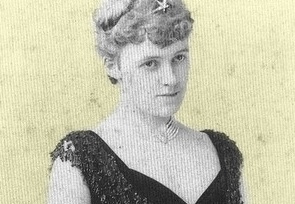
In the summer of 1907, Edith Wharton met the journalist W. Morton Fullerton through their mutual friend, Henry James, and began a passionate and life-changing love affair. However, today’s letter shows a sad end to the romance the following year, as Wharton, pleading the depth and meaning of their relationship, begs Fullerton to answer her letters.
[The Mount]
August 26 [1908]
Dear, won’t you tell me the meaning of this silence?…
I re-read your letters the other day, & I will not believe that the man who wrote them did not feel them, & did not know enough of the woman to whom they were written to trust to her love & courage, rather than leave her to this aching uncertainty.
What has brought about such a change? Oh, no matter what it is—only tell me!
I could take my life up again courageously if I only understood; for whatever those months were to you, to me they were a great gift, a wonderful enrichment; & still I rejoice & give thanks for them! You woke me from a long lethargy, a dull acquiescence in conventional restrictions, a needless self-effacement. If I was awkward & inarticulate it was because, literally, all one side of me was asleep.
I remember, that night we went to the “Figlia di Iorio,” that in the scene in the cave, where the Figlia sends him back to his mother (I forget all their names), & as he goes he turns & kisses her, & then she can’t let him go—I remember you turned to me & said laughing: “That’s something you don’t know anything about.”
Well! I did know, soon afterward; & if I still remained inexpressive, unwilling, “always drawing away,” as you said, it was because I discovered in myself such possibilities of feeling on that side that I feared, if I let you love me too much, I might lose courage when the time came to go away!—Surely you saw this, & understood how I dreaded to be to you, even for an instant, the “donna non più giovane” who clings & encumbers—how, situated as I was, I thought I could best show my love by refraining—& abstaining? You saw it was all because I loved you?
And when you spoke of your uncertain future, your longing to break away & do the work you really like, didn’t you see how my heart broke with the thought that, if I had been younger & prettier, everything might have been different—that we might have had together, at least for a short time, a life of exquisite collaborations—a life in which your gifts would have had full scope, & you would have been able to do the distinguished & beautiful things that you ought to do?—Now, I hope, your future has after all arranged itself happily, just as you despaired—but remember that those were my thoughts when you were calling me “conventional”…
Yes, dear, I loved you then, & I love you now, as you then wished me to; only I have learned that one must put all the happiness one can into each moment, & I will never again love you “sadly,” since that displeases you.
You see I am once more assuming that you do care what I feel, in spite of this mystery! How can it be that the sympathy between two people like ourselves, so many-sided, so steeped in imagination, should end from one day to another like a mere “passade”—end by my passing, within a few weeks, utterly out of your memory? By all that I know you are, by all I am myself conscious of being, I declare that I am unable to believe it!
You told me once I should write better for this experience of loving. I felt it to be so, & I came home so fired by the desire that my work should please you! But this incomprehensible silence, the sense of your utter indifference to everything that concerns me, has stunned me. It has come so suddenly…
This is the last time I shall write you, dear, unless the strange spell is broken. And my last word is one of tenderness for the friend I love—for the lover I worshipped.
Goodbye, dear.
Oh, I don’t want my letters back, dearest! I said that in my other letter only to make it easier for you if you were seeking a transition—
Do you suppose I care what becomes of them if you don’t care?
Is it really to my dear friend—to Henry’s friend—to “dearest Morton”—that I have written this?
From The Letters of Edith Wharton. Edited by R. W. B. Lewis and Nancy Lewis. New York: Collier Books, 1988.
FURTHER READING
Edith Wharton’s affair with Morton Fullerton became the inspiration for Summer, her 1917 novel of sexual awakening and disillusionment. Get the full text from Project Gutenberg here.
Wharton and Fullerton’s story fascinates writers today as well. Here, read an excerpt of The Age of Desire, a biographical novel by Jennie Fields, reviewed here.
Read Stendhal’s reaction to a similar situation in our June 24 post, here.


